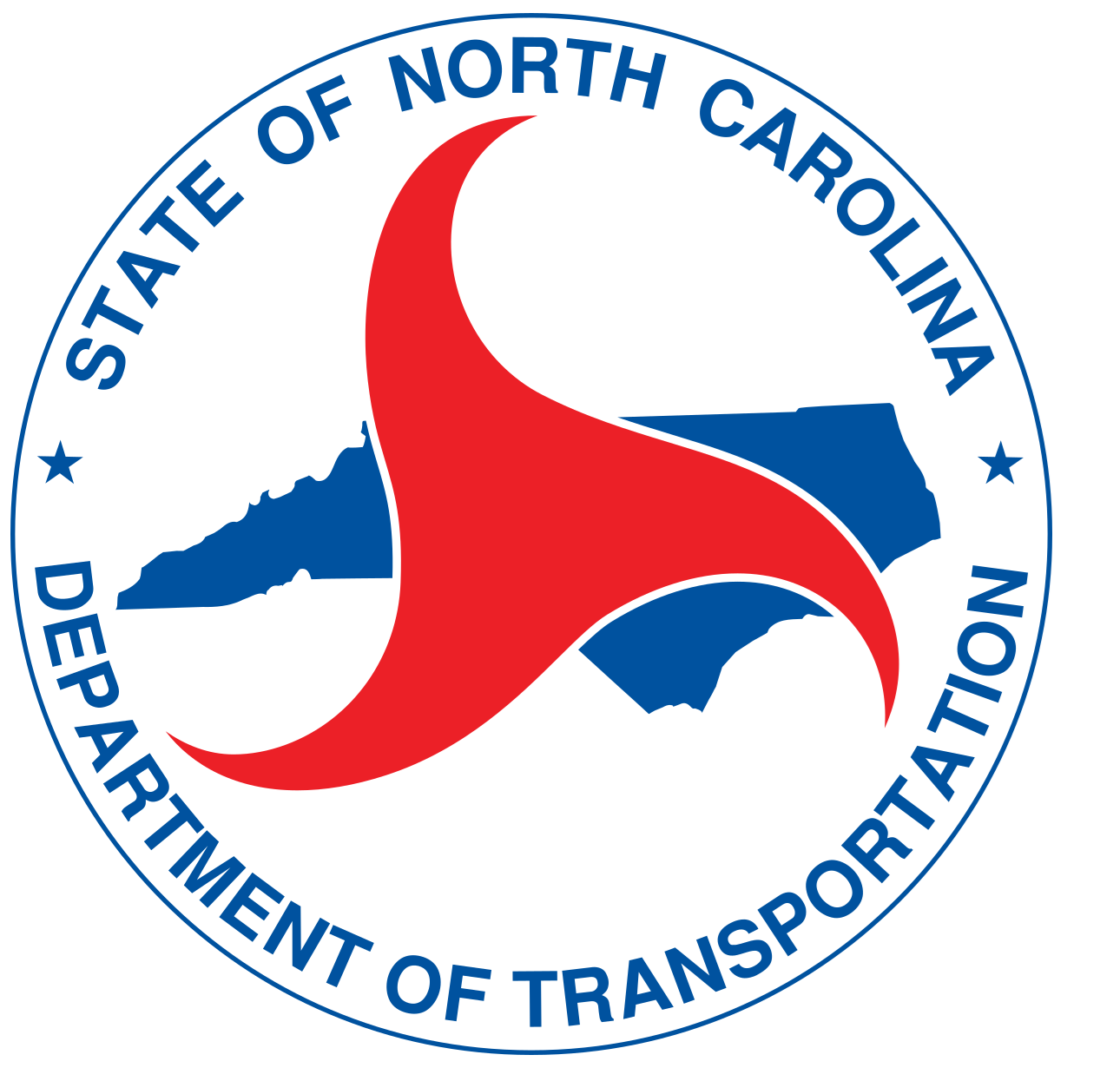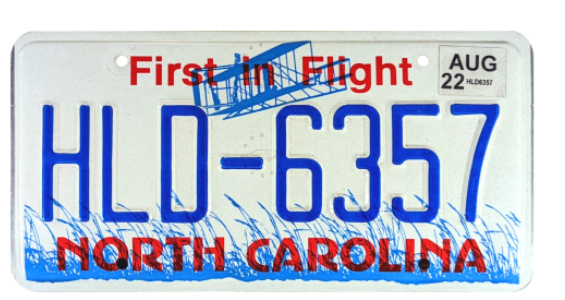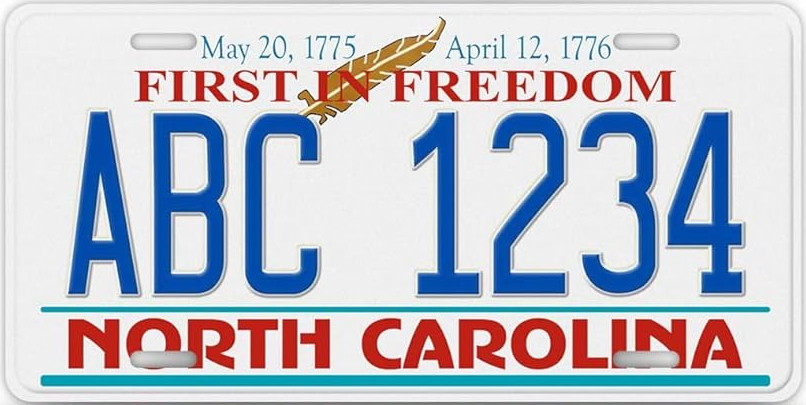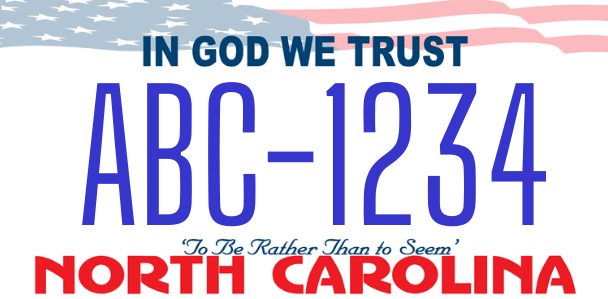Free North Carolina License Plate Lookup
Search and lookup any NC license plate and get a free vehicle report
Whether you’re buying a used car or researching its background, our North Carolina license plate lookup tool provides key details like accident reports and title histories. Make wise choices with North Carolina license plate search now!
North Carolina (NC) current auto market is characterized by strong demand for both new and used vehicles, with an emphasis on fuel-efficient and hybrid models. The state’s urban landscape, particularly in cities like Charlotte and Raleigh, is rapidly growing, leading to increased traffic congestion and a higher demand for reliable and spacious vehicles. North Carolina boasts an extensive road system, but issues such as potholes, road construction, and unpredictable weather conditions can pose significant hazards for drivers.
Navigating North Carolina’s car market requires diligence. Use North Carolina free license plate lookup to access NC vehicle history reports and make confident, informed choices in the state’s dynamic automotive market.
Content Overview
- Information from an Illinois License Plate Lookup
- Benefits of a North Carolina License Plate Search
- How to Use the North Carolina License Plate Lookup Tool
- What is a North Carolina license plate?
- How do I get a license plate in North Carolina?
- Transfer North Carolina License Plate to Another Vehicle
- North Carolina’s Vehicle Market and Trends
- North Carolina License Plate Search and Vehicle Laws
- North Carolina License Plate Search and DMV FAQs
North Carolina DMV Contact:
 Customer Service:
Customer Service:
(919) 715-7000
Hours of Operation:
Monday – Friday,
7 a.m. – 5 p.m.
VinCheckPro offers a free North Carolina license plate search that reveals important information about registered vehicles in the state. This tool provides various details, such as:
-
- Accidents or Damages: This crucial section covers any incidents affecting the vehicle, including collisions and damage from external factors like vandalism or fallen objects.
- Odometer Indications: Easily compare reported mileage against the actual odometer reading to ensure accuracy and uncover potential discrepancies.
- Recalls & Defects: Stay informed about any recalls or known defects associated with the specific make and model of the vehicle.
- Lien & Repossession Records: Understand if the vehicle has been used as collateral in a loan, helping you avoid financial entanglements.
- Theft & Recovery Records: Discover if the vehicle has been reported stolen and subsequently recovered, providing critical insight into its history.
- Flood, Hail, and Fire Damage: Learn about any damage resulting from natural disasters, which can have long-term implications for the vehicle’s integrity.
- Mileage Rollback: Guard against odometer fraud by verifying the reported mileage against historical records.
- Sale history, estimated ownership costs, and market value: This information provides valuable insights into the vehicle’s past, potential future expenses, and current market value.
- Vehicle Specifications: Ensure that all standard equipment, including body color and tires, align with the vehicle’s description.
- Previous Use: Identify if the vehicle has been utilized for personal, taxi, or police purposes, offering insight into its past usage.
- Service, Inspection, and Registration History: Gain a comprehensive overview of the vehicle’s maintenance and registration records, providing valuable context for its overall condition.
The North Carolina license plate search delivers quick, detailed reports to give buyers confidence and peace of mind. Get your North Carolina vehicle history report now—fast, easy, and reliable!
A North Carolina license plate lookup tool offers a variety of unique benefits for buyers, sellers, and other parties involved in the vehicle market. Here are some key advantages:
| Comprehensive Vehicle Data | Access detailed information about the vehicle’s history, including ownership records, accident reports, and maintenance history. |
|---|---|
| Easy-to-Access Public Records | View public records that are available for free, ensuring you get the details you need without complicated processes. |
| Avoiding Fraud or Bad Purchases | Check for any reported issues or title discrepancies, helping you avoid purchasing a car with a hidden past. |
| Reveals Ongoing Legal Disputes or Liens | You can check if the vehicle has any legal disputes or financial liens, which could affect your ability to fully own the vehicle or lead to future complications. |
| Insurance Risk Assessment | Knowing a vehicle’s history can help you understand its potential insurance risk, giving you insight into higher premiums that could arise due to a past accident or title issues. |
| Establishing Fair Market Value | Helps both buyers and sellers determine a fair price based on the car’s history, condition, and market trends. |
How Can North Carolina License Plate Lookup Help Me?
A free North Carolina license plate search can offer useful insights in various scenarios:
| Car Buyers & Owners | Access detailed vehicle history, previous ownership, and uncover any potential issues before making a purchase or managing your car. |
|---|---|
| Dealerships & Sellers | Authenticate the vehicle’s background to ensure a smooth transaction and avoid selling problematic vehicles. |
| Insurance Providers | Verify vehicle details and ownership to help set accurate insurance premiums and streamline claim processing. |
| Law Enforcement | Track stolen vehicles and investigate traffic violations or related criminal activities associated with a specific vehicle. |
| Private Investigators | Collect key information for personal investigations or legal matters requiring verification of vehicle history. |
| Fleet Management | Maintain accurate records and monitor the condition of your vehicle fleet for effective management and oversight. |
| Rental Agencies | Review the history of vehicles to ensure they are safe and reliable for customers, minimizing potential risks. |
| Financial Institutions | Confirm vehicle information to support loan processing and minimize the risk of fraud during financing. |
| Attorneys & Legal Professionals | Obtain relevant vehicle details to support legal cases and investigations requiring vehicle history verification. |
| Government Agencies | Monitor registered vehicles for compliance with state regulations and administrative requirements. |
| Car Auction Houses | Verify the authenticity and background of vehicles sold at auction to ensure buyer confidence. |
| Auto Repair Shops | Check vehicle histories to assess maintenance records and warranty status, helping to ensure accurate repairs. |
| Consumer Protection Organizations | Investigate consumer complaints and help safeguard buyers from potential fraud or deceptive practices. |
| Towing Services | Confirm ownership and registration details when towing vehicles to ensure proper handling and documentation. |
Simply enter the license plate number in the North Carolina license plate search tool. The system cross-references the plate with government, insurance, and public records to deliver a comprehensive vehicle history report within moments.
1. Go to VinCheckPro.com
Head to VinCheckPro.com in your browser to get started. If you’re already on the North Carolina License Plate Lookup page—jump to step 4.
2. Go to the License Plate Lookup Option
Start at the homepage and find the “License Plate Lookup” option at the top. Click on it to dive in.
3. Choose North Carolina as the State
Once you’re on the License Plate Lookup page, just enter the North Carolina plate number you want to investigate. If North Carolina isn’t pre-selected, simply choose it from the dropdown menu.
4. Enter the North Carolina License Plate Number
Next, enter the full North Carolina license plate number exactly as it appears on the plate in the designated field.
5. Start the Search
Hit the “Search” or “Lookup” button to kick off the process.
6. Review the Report
Once the North Carolina license plate lookup search is complete, you’ll unlock a comprehensive report packed with essential vehicle details—everything from accident history and title status to specifications, insurance records, warranty coverage, and any outstanding recalls. Before sealing the deal on a used car in North Carolina, use this powerful tool to dig deep into the vehicle’s past, ensuring it’s clear of hidden issues.
A North Carolina license plate is a plate made of metal or plastic that is attached to a vehicle to show that it’s registered with the state of North Carolina. These rear or back license plates have a combination of letters and numbers that are specific to each vehicle, along with the state’s name and the year of registration. The North Carolina Division of Motor Vehicles (DMV) is responsible for issuing these plates, and they need to be renewed on a yearly basis.
North Carolina offers various types of license plates, each with its own set of requirements and fees.
| Three Main License Plate Types | |
|---|---|
| Standard |
The most common license plates in North Carolina feature the state name, a small graphic, and a combination of letters and numbers.
|
| Personalized | Allow vehicle owners to choose their own combination of letters and numbers, as long as it meets certain guidelines set by the DMV. |
| Specialty | Feature designs and logos that are specific to certain organizations or causes, such as military, universities, or sports teams. |
| Specialty License Plates – Subtypes | |
|---|---|
| Collegiate | Features the logo and name of a North Carolina university or college. |
| Military | Available to members of the armed forces and their families and feature various designs to represent different branches of the military. |
| Veteran | Available to veterans of the U.S. Armed Forces and feature the word “Veteran” along with the branch of service in which the veteran served. |
| Disability | Issued to individuals with disabilities and allow for accessible parking privileges. |
| Antique | Available for vehicles that are at least 30 years old and are used for exhibitions, parades, and other similar events. |
To get detailed information, you can visit the North Carolina DMV website or reach out to a nearby DMV office.
To get a North Carolina license plate, you need to follow these steps:
1. Register your vehicle with the North Carolina Division of Motor Vehicles (DMV). You will need to provide proof of ownership, such as a title, and pay the registration fee.
2. Choose your license plate type. North Carolina offers several types of license plates, including standard plates, personalized plates, and specialty plates. Choose the type of plate that best fits your needs.
3. Fill out the license plate application, which is available on the North Carolina DMV website or at a local DMV office. Be sure to provide accurate and up-to-date information.
4. Submit required documents. Depending on the type of license plate you are applying for, you may need to provide additional documentation, such as proof of residency or membership in a specific organization.
5. Pay the fee. There is a fee associated with getting a North Carolina license plate, which varies depending on the type of plate you choose. Be sure to bring payment in the form of cash, check, or credit card.
Once your application has been processed and your fee has been paid, you will receive your license plate. Affix it to your vehicle as directed by the DMV.
Absolutely, you can transfer your North Carolina license plate to another vehicle that you own. To do this, you’ll need to go to a nearby DMV office and fill out the required forms.
Here’s a brief guide on how to transfer your license plate:
-
- Visit a local DMV office in person to transfer your license plate.
- Provide the title and registration for both the vehicle that currently has the license plate and the vehicle you want to transfer the plate to. You will also need to provide proof of insurance for the new vehicle.
- Fill out the license plate transfer form provided by the DMV.
- Pay any applicable fees, which varies depending on the type of vehicle and the type of license plate.
- Once all requirements are met, the transfer can be completed either online, by mail, or in person at a DMV office.
Keep in mind that not all license plates can be transferred, and there might be extra criteria based on the type of plate you have. Also, if your previous vehicle is no longer in use, you must return the plate to the DMV.
More green-friendly vehicles: The state has surpassed its initial goal of 80,000 zero-emission vehicles (ZEVs) by 2025, reaching this milestone two years ahead of schedule. This achievement is a testament to the growing popularity of EVs, driven by both consumer demand and state policy initiatives. Governor Roy Cooper’s executive orders have set ambitious targets, including a new goal of 1.25 million ZEVs by 2030, emphasizing a future of cleaner transportation
More EV charging stations: This rapid growth in EV adoption is supported by a significant expansion of charging infrastructure. The number of public charging stations has increased from 1,400 in 2019 to nearly 4,000 in 2024, with plans for more under programs like the National Electric Vehicle Infrastructure (NEVI) program.
Rise of online taxi apps affect ownership: The rise in ride-sharing services like Uber and Lyft has affected local vehicle ownership trends, especially in urban areas like Charlotte and Raleigh.
Off-road vehicles popular in rural areas: In rural parts of the state, vehicles with off-road capabilities, such as the Jeep Wrangler and Toyota Tacoma, remain highly popular due to their versatility in diverse terrains.
Autonomous Vehicle Testing: North Carolina has become a hub for the production and testing of autonomous vehicles, particularly in areas like the Research Triangle (Raleigh-Durham-Chapel Hill). The state’s infrastructure, along with strong collaborations between local universities and tech companies, makes it an ideal location for innovation in self-driving technology.
| Motor Vehicle Safety Inspection | North Carolina requires all vehicles (except certain new ones) to undergo a safety inspection annually to ensure roadworthiness. This includes checks on brakes, lights, tires, and other essential components. |
|---|---|
| Emissions Testing | In certain counties (including urban areas like Charlotte and Raleigh), vehicles are required to undergo emissions testing to reduce air pollution. This is part of North Carolina’s efforts to meet federal air quality standards. |
| Seat Belt Law | North Carolina has a primary seat belt law, meaning that law enforcement officers can stop and ticket a driver if they or their passengers are not wearing seat belts, regardless of other infractions. |
| DUI/DWI Laws | North Carolina has a zero-tolerance policy for drivers under 21 who are caught with any alcohol in their system. The state also has a legal blood alcohol content (BAC) limit of 0.08% for adult |
| Distracted Driving Law | Texting while driving is prohibited in North Carolina. Hands-free devices are allowed, but using a phone in hand while operating a vehicle can result in fines. |
| No-Texting Zones | Texting while driving is not only banned but also a violation of state laws, particularly in specific no-texting zones, such as near schools or high-traffic intersections. |
| Car Insurance Requirements | North Carolina requires drivers to carry liability insurance, with minimum coverage of $30,000 for injury/death per person, $60,000 for injury/death per accident, and $25,000 for property damage. |
Is it free to perform a license plate search in North Carolina?
While basic information may be available for free, more detailed reports—such as ownership history, accident records, or liens—often require a paid service. However, VinCheckPro.com offers a license plate search tool that combines the best of both worlds: it’s comprehensive and free, supported by internet traffic and ads to sustain its operation.
What details can I uncover with a North Carolina license plate lookup?
A North Carolina license plate lookup with VinCheckPro provides key information about a vehicle’s history, including accident reports, odometer discrepancies, recalls, lien and repossession records, theft and recovery details, and damage from floods, hail, or fire. It also reveals sale history, ownership costs, market value, and vehicle specifications such as body color and tires. Additionally, you can uncover past use (e.g., personal, taxi, or police) and access service, inspection, and registration history for a comprehensive view of the vehicle’s condition.
Is the information from a North Carolina license plate lookup always accurate?
The accuracy of information from a North Carolina license plate lookup depends on the source. Government databases and reputable vehicle history report services are typically reliable, whereas free third-party services may not always be up-to-date.
How can I renew my North Carolina license plate registration?
License plate registration in North Carolina can be renewed online via the NC DMV website, by mail, or in person at a local DMV office. Be sure to have your vehicle information and payment ready.
What documents are needed to register a vehicle in North Carolina?
When registering a vehicle, you’ll need proof of identity, proof of residency, the vehicle title, proof of insurance, and payment for registration fees.
How long do I have to register my vehicle in North Carolina after moving here?
New residents of North Carolina must register their vehicle within 60 days of establishing residency. Failure to do so may result in late fees.
What is the cost of a North Carolina license plate?
The cost of a license plate in North Carolina varies based on vehicle type, weight, and registration period. Standard plates generally range from $30 to $50 annually, but specialty plates may cost more.
What should I do if my license plate is stolen in North Carolina?
If your license plate is stolen, report it to the local police and the North Carolina DMV immediately. You will need to file a report and request a replacement plate through the NC DMV, either online or at a local office.
How do I resolve a lien on a North Carolina vehicle registration?
If there is a lien on your vehicle, you must provide proof of lien release or payment to the DMV to clear it. This is often required when selling or transferring ownership.
How can I find the owner of a North Carolina license plate?
To find the owner of a North Carolina license plate, you generally need a valid reason and must follow privacy laws. You can contact law enforcement or the North Carolina DMV if you have a legitimate need, such as being involved in an accident or reporting suspicious activity. A licensed private investigator may also help, as they have access to specific databases.
In case of an accident, your insurance company may assist with contacting the other driver. Public records requests may be an option, though they can be time-consuming. Some online services offer license plate lookup, but their accuracy may vary. Always ensure that your reason for accessing this information is legal, as privacy laws prohibit unauthorized use.
Can I look up vehicle records and history by VIN in North Carolina?
Aside from using a North Carolina License Plate Search, you can also check a vehicle’s history in North Carolina using VinCheckPro.com or other similar services, which can come in handy especially if you don’t have an NC plate number with you.
Option 1: VinCheckPro.com North Carolina VIN Check
1. Go to the VinCheckPro.com website.
2. Find the VIN lookup tool on the website’s homepage and enter the Vehicle Identification Number (VIN) for the vehicle you wish to check.
3. Click the “Check this VIN” button to start the search process.
4. VinCheckPro will generate a vehicle history report that include details such as accident history, title history, recalls, odometer readings, and more.
Option 2: North Carolina DMV
1. Visit the North Carolina DMV Website (https://www.ncdot.gov/dmv/Pages/default.aspx).
2. Follow the instructions provided on the website to submit your request and provide the necessary information, including the VIN.
3. Pay any applicable fees for accessing vehicle records through the DMV. The website will provide details on fees and processing times.
Option 3: Vehicle History Report Providers
There are several alternatives to VinCheckPro.com for obtaining vehicle history reports, including Carfax, VinAudit.com, and other third-party providers.


